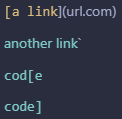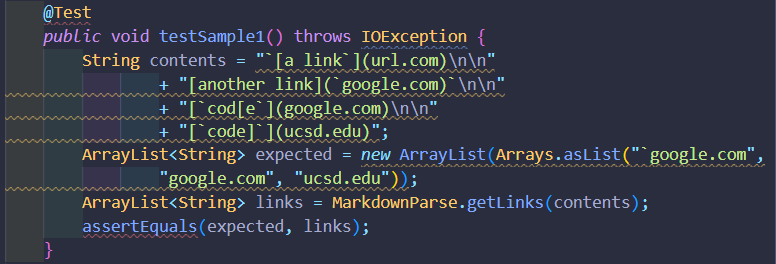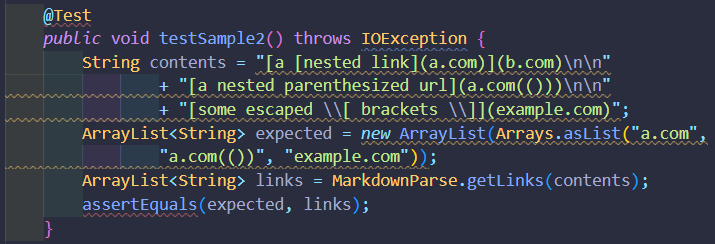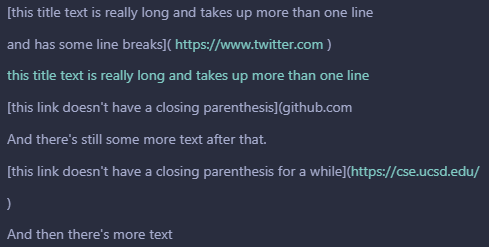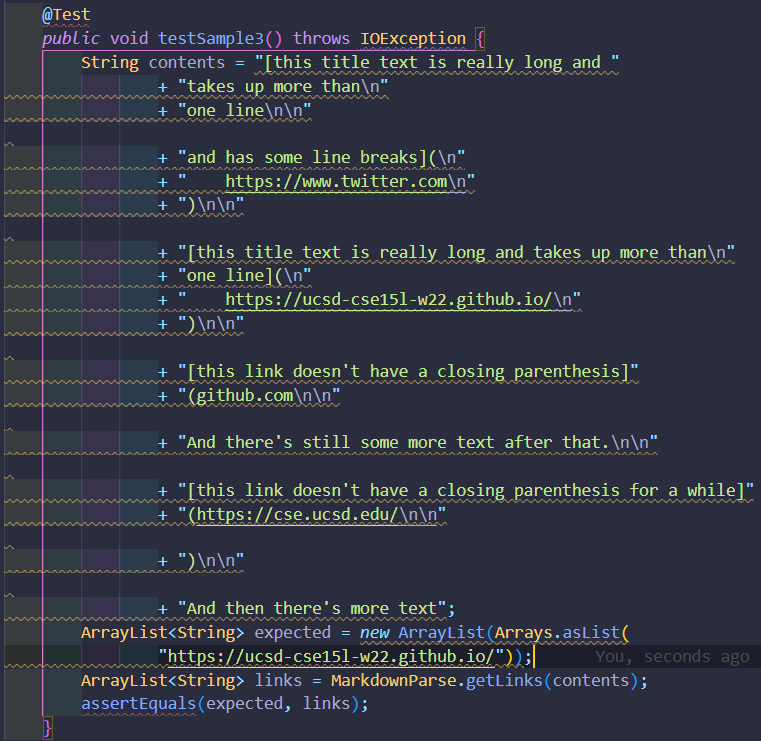Lab Report 4 - 2/25/2022
In this report, I am going to demonstrate whether our implementation of Markdown Parse class (a program that detects all valid links in a markdown file) and another group’s implementation are handling the sample .md files correctly.
Link to our group’s implementation: https://github.com/Alexander-Kourjanski/markdown-parse
Link to the other group’s implementation: https://github.com/austin-li/CSE15L-TheLunaMoths
Here is the table of content:
Test 1
The first snippet of the test is:
`[a link`](url.com)
[another link](`google.com)`
[`cod[e`](google.com)
[`code]`](ucsd.edu)
According to Visual Studio Code Preview, it looks like:
As you can see, only the last three lines are recognized as links - the expected result from the program should be
["`google.com", "google.com", "ucsd.edu"].
Thus, I built the following test case:
Turns out neither of the groups passed the test:
Our group’s result:
Here, from the second line of the output, you can see that there is an error: instead of the expected
["`google.com", "google.com", __"ucsd.edu"__], our program outputted[__"url.com"__, "`google.com", "google.com"], where the underlined part is the difference.And the other group’s result:
From the second line of the output, you can see that there is an error: instead of the expected
["`google.com", "google.com", __"ucsd.edu"__], their program outputted[__"url.com"__, "`google.com", "google.com"], where the underlined part is the difference - we had the exact same output.
Test 2
The second snippet of the test is:
[a [nested link](a.com)](b.com)
[a nested parenthesized url](a.com(()))
[some escaped \[ brackets \]](example.com)
According to Visual Studio Code Preview, it looks like:
Here, all three lines contain parts that are recognized as links - the expected result from the program should be
["a.com", "a.com(())", "example.com"].
Thus, I built the following test case:
Again, neither of the groups passed the test:
Our group’s result:
Here, from the second line of the output, you can see that there is an error: instead of the expected
["a.com", __"a.com(())", "example.com"__], our program outputted["a.com", __"a.com(("__], where the underlined part is the difference.And the other group’s result:
From the second line of the output, you can see that there is an error: instead of the expected
["a.com", __"a.com(())", "example.com"__], their program outputted["a.com", __"a.com(("__], where the underlined part is the difference. Interestingly enough, we still have the same outputs. What a coincidence!
Test 3
The third snippet of the test is:
[this title text is really long and takes up more than
one line
and has some line breaks](
https://www.twitter.com
)
[this title text is really long and takes up more than
one line](
https://ucsd-cse15l-w22.github.io/
)
[this link doesn't have a closing parenthesis](github.com
And there's still some more text after that.
[this link doesn't have a closing parenthesis for a while](https://cse.ucsd.edu/
)
And then there's more text
According to Visual Studio Code Preview, it looks like:
Only the third line is recognized as a link - the expected result from the program should be
["https://ucsd-cse15l-w22.github.io/"].
Thus, I built the following test case:
Neither of the groups passed the test (this is funny because repetition):
Our group’s result:
Here, from the second line of the output, you can see that there is an error: instead of the expected
["https://ucsd-cse15l-w22.github.io/"], our program outputted a long piece of string that, although containing the target line, also contain a lot of random information that are not links.And the other group’s result:
Again, from the second line of the output, you can see that there is an error: instead of the expected
["https://ucsd-cse15l-w22.github.io/"], their program outputted an empty list, surprisingly.
Potential Code Changes
Here I discuss whether I think there is a small code change that can make my group’s program work for snippet 1, 2, and 3.
For snippet 1, I believe so. I simply need to check whether a backtick exist for the square bracket part of the link since it does not affect the parenthesis part. In other words, I can check (two times, before and after the open square bracket) whether a backtick exists. If it does, the search jump to the next backtick.
For snippet 2, I do not think so. The cases that our program failed are quite different: to fix the code, I need to check for both the case involving nested open and close brackets and escaping characters. It would take a couple while loops to skip the escaping characters already, and I need to make a stack to iterate through and account for the nested parenthesis.
For snippet 3, I do think so. To check for the failed cases, I just need to add
a check between index of open bracket and close parenthesis that whether the
substring "\n\n" exists. Discard the link and continue forwards if it does.
